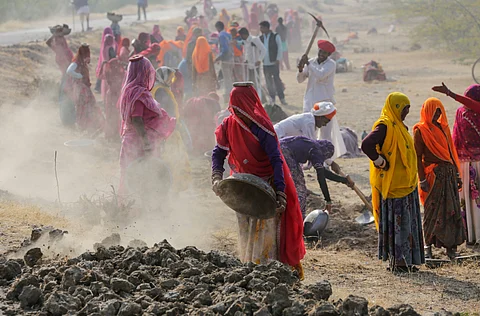

Funding freeze: Allocations for MGNREGA have remained static at Rs 86,000 crore since 2023–24 despite rising inflation and demand.
Huge dues: Pending liabilities total Rs 23,446.27 crore, consuming over a quarter of the current year’s budget.
Wages and work days: Panel urges an increase in minimum guaranteed work days from 100 to 150 and wage revision linked to a more accurate inflation index.
Committee slams ministry’s response as “silent and evasive” and warns against making Aadhaar-based wage payments mandatory.
The Parliamentary Standing Committee on Rural Development has criticised the central government for keeping allocations to the Mahatma Gandhi National Rural Employment Guarantee Act (MGNREGA) unchanged since 2023-24, despite rising demand, inflation and pending dues.
In a report tabled in the Lok Sabha on August 11, 2025 by Congress Member of Parliament Saptagiri Ulaka, the committee said it “cannot comprehend” the rationale for freezing funds for the demand-driven scheme. It also recommended increasing the minimum guaranteed work days from 100 to 150 and revising wages to reflect inflation.
“The committee is concerned about the persistent delays in the disbursement of the Centre’s share of funds under the wage and material components of MGNREGA across multiple states and Union Territories,” the report observed.
The panel noted that as of February 15, 2025, unpaid liabilities under MGNREGA stood at Rs 12,219.18 crore for wages and Rs 11,227.09 crore for material costs — meaning a total of Rs 23,446.27 crore or 27.26 per cent of the current budget.
This, it said, meant over a quarter of the funds allocated for 2025-26 would be used to settle previous years’ dues, leaving only Rs 62,553.73 crore for the current year’s work. This significantly limits the scheme’s capacity to function effectively and meet its primary objective of preventing rural distress and ensuring livelihood security.
The committee feels that both aspects of MGNREGA, ie, the demand-driven nature of the scheme and creation of assets under it, are severely hampered through such pendencies
Parliamentary Standing Committee on Rural Development
Funding has remained static at Rs 86,000 crore since 2023–24.
In its action taken reply, the Department of Rural Development, under the Union Ministry of Rural Development, said the release of funds was an “ongoing process” and that the Centre would ensure timely availability “in accordance with the demand for work generated on the ground”.
The committee rejected the response as “stereotypical in nature” and failing to address the core issue with the seriousness it warrants.
It is unfathomable as to how a specific query of the committee can be sidelined and [with the department] remaining silent and evasive on such an important matter
Parliamentary Standing Committee on Rural Development
Seventeen years after the 2005 Act was fully implemented in the country, “much water has flown under the bridge”, the panel observed, adding that changes were needed to keep pace with growing rural distress. It urged the ministry to diversify the type of works under MGNREGA to enable an increase in guaranteed work days to at least 150, adding that the government has not implemented any significant changes despite multiple recommendations.
“The committee opines that a long standing demand from various quarters of the country has been that of increasing days of guaranteed work under MGNREGA from the existing 100 days,” it observed.
The committee also expressed concern over inadequate wage rates, wide disparities between states and Union Territories and the continued linkage of MGNREGA wages to the Consumer Price Index for Agricultural Labourers, which it said did not fully capture the real impact of inflation. It recommended revising the index used and exploring a standardised national wage rate.
“Taking up works under MGNREGA is often a last resort for the rural poor,” it noted, adding that wages of such a nominal nature only discourage them and propel migration to areas offering better pay
The panel also advised against making the Aadhaar-Based Payment System mandatory for wage transfers under the scheme.